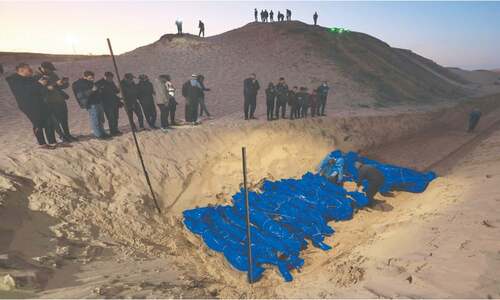THE WAR aims of Israeli Prime Minister Benjamin Netanyahu and Gaza’s Hamas leader Yahya Sinwar look unattainable in 2024, and their fight may consign the Palestinian territory to yet more devastation and an open-ended Israeli occupation.
Netanyahu seeks to obliterate Hamas for Israel’s bloodiest day ever, seemingly willing to raze much of Gaza to the ground and risk reimposing a military occupation in the enclave Israel left in 2005.
Sinwar, meanwhile, hopes to trade the remaining prisoners in their custody for thousands of Palestinians still in Israeli detention, end the Israeli-Egyptian blockade of Gaza and put Palestinian statehood back in play.
Why it matters
Palestinians initially felt pride that Hamas fighters had shattered Israel’s image of invincibility, but soon realised the attack would draw a terrifying response.
Weeks of bombardment have left most of the strip in ruins, killing more than 21,000 people and wounding 55,000, according to Palestinian health authorities and displacing 1.9 million.
Hamas is dug deep into the territory’s dense cities and refugee camps and there is little sign they are close to defeat, with battles continuing across the enclave and their leaders still at large.
The Israeli military has expressed regret for civilian deaths but blames Hamas for operating in densely populated areas or using civilians as human shields, a charge the group denies.
What it means for 2024
Israel’s army chief predicts the war will last for months. Even if the war ends early in the year, Israel will likely maintain a military occupation, drawing frowns from allies as Palestinians suffer in tent cities squeezed against the enclave’s border with Egypt.
Netanyahu has yet to articulate a plan for post-war Gaza, but his government has told several Arab states it wants to carve out a buffer zone to prevent a repeat of the Oct 7 raid.
No Palestinian authority acceptable to Israel appears able to take over soon, nor will Hamas readily cede control. Most Arab states are unwilling to get involved. That leaves Israeli occupation, an ongoing siege and no real reconstruction.
Netanyahu and Israel face risks with troops deployed in a dangerous urban war zone and world opinion turning against them, but the risks for Sinwar may be greater still.
If Sinwar survives the onslaught, he will be left with an enclave in ruins, a battered or weakened military base and a local population enduring hunger and homelessness.
“I don’t think there is much appetite for anyone to be standing in and occupying Gaza instead of the Israelis. So the realistic way forward, which, I’m not advocating at all, is Israeli reoccupation,” said Joost R. Hiltermann, Middle East and North Africa Program Director of the International Crisis Group.
“It’s very difficult to see how Israel could withdraw from Gaza,” he said.
Long-term occupation
The Israeli vision for post-war Gaza so far, most politicians and analysts say, is to emulate the occupied West Bank model by having some designated authority running civic affairs while Israel maintains security control.
The West Bank-based Palestinian Authority (PA) is also unacceptable to Israel despite the insistence of its US ally.
Israel would instead prefer a multinational authority, including Arab allies, incorporating a Palestinian council and technocrats, two regional politicians told Reuters.
“No one (Arab states) wants to take control of Gaza. Israel will deal with Gaza like the West Bank after the war. Israeli forces will go in and out as they wish,” said Marwan Al-Muasher, Jordan’s former foreign minister, now Vice President for Studies at the Carnegie Endowment for International Peace in Washington.
This could mean the United Nations and humanitarian agencies providing services inside Gaza until Washington persuades Israel to accept a revitalised PA to govern the territory or to agree to some other arrangement.
“I don’t believe Israel would militarily leave Gaza. It would retain the security responsibility that will allow its forces to enter, attack, raid and arrest when they want and as they want,” said Ghassan Al Khatib, a Palestinian analyst.
“They don’t want to leave militarily from Gaza because Hamas will regroup. It will be a matter of time, one year, two or three and things will go back to where they were,” he added.
Netanyahu has said Israel will keep some form of security control of all Gaza indefinitely, though he insists that this would not amount to reoccupying the strip.
Messy campaign
Analysts say that achieving Israeli goals will likely result in thousands more civilian deaths, the decimation of what remains of Gaza, further displacement of hundreds of thousands of Gazans and perhaps a mass exodus to Egypt despite Cairo’s objections.
Israel’s insistence on eliminating Hamas may be undergoing a reassessment or shift in strategy. Longer term, two regional sources say, Israel could attempt more focused raids.
But eliminating leading commanders would not be enough for Israel to claim it had destroyed the group, declare victory and end the war. Most Hamas leaders already are successors to ones previously assassinated by Israel.
“Killing the leadership doesn’t affect a movement that has a full organizational hierarchy and grassroots. If they kill one, another will take over as we have seen before,” Khatib said.
Most analysts argue it will be nearly impossible to eradicate the Hamas ideology, with recent polls showing a rise in its popularity.
In the West Bank, a rising number of Israeli army raids, renewed settler violence, confiscation of Palestinian land and detention of activists and fighters are closing the window for any settlement.
“I believe this war will have an extreme reaction and impact on the Israeli society. Israel as a society and as a political elite will become more radical,” said Khatib, a professor of politics at Birzeit University in the West Bank.
“There is no political horizon, whatever was left has evaporated, Khatib added.
Published in Dawn, january 1st, 2024

















































